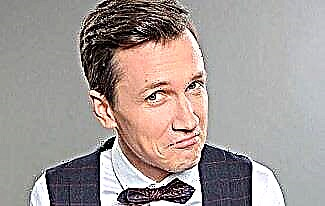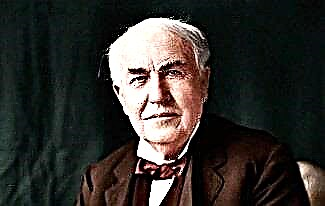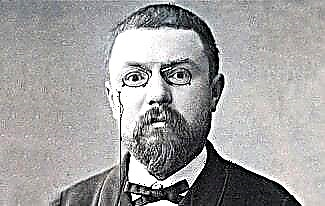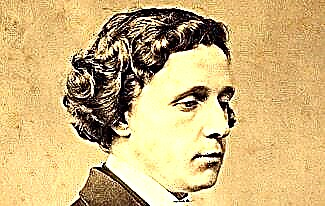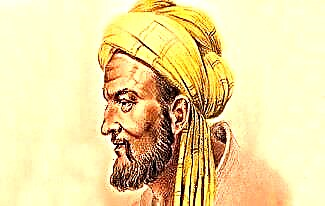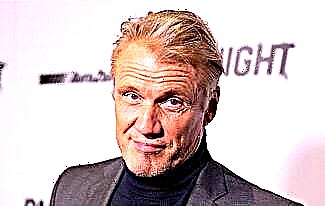Valentina Ivanovna Matvienko (nee Tyutin; genus. Chairman of the Federation Council of the Federal Assembly of Russia since 2011 Governor and Chairman of the Government of St. Petersburg (2003-2011). Member of the Supreme Council of the United Russia faction.
There are many interesting facts in the biography of Valentina Matvienko, which we will tell about in this article.
So, before you is a short biography of Matvienko.

Biography of Valentina Matvienko
Valentina Matvienko was born on April 7, 1949 in the Ukrainian city of Shepetivka, located today in the Khmelnytsky region. She grew up in a simple family of Ivan Yakovlevich and Irina Kondratyevna Tyutin. In addition to her, Valentina's parents had two more daughters - Lydia and Zinaida.
Childhood and youth
The childhood years of the future politician were spent in Cherkassy. When she was in the 2nd grade in the biography of Matvienko, the first serious loss occurred - her father was gone.
As a result, Irina Kondratyevna had to raise three girls herself, as a result of which she often faced material difficulties. At school, Valentina received high marks in almost all disciplines, so she was able to graduate with a silver medal.
Having received a certificate, the girl entered a medical school, from which she graduated with the highest marks in all disciplines. Then Matvienko graduated from the Leningrad Chemical and Pharmaceutical Institute.
Having become a certified specialist, Valentina was assigned to graduate school. An interesting fact is that in her youth she wanted to become a scientist, but everything changed after she was offered a position in the district committee of the Komsomol.
At the age of 36, Matvienko graduated from the Academy of Social Sciences under the Central Committee of the CPSU, and a few years later she took advanced training courses for leading diplomats at the Diplomatic Academy of the Ministry of Foreign Affairs.
Career
Before becoming what she became, Valentina Matvienko had to go through all the steps of the career ladder. During the biography of 1972-1977. she worked as first secretary in one of the Leningrad regional committees of the Komsomol.
Later, Valentina Ivanovna managed the affairs of the regional level. She got into big politics in 1986, taking the post of deputy chairman of the executive committee of the City Council of People's Deputies of Leningrad, dealing with issues of culture and education.
Three years later, Matvienko was elected as a People's Deputy of the USSR. She headed the Committee for the Protection of Family, Children and Women. After the collapse of the Soviet Union, she was entrusted with the post of Russian ambassador to Malta.

From 1995 to 1997, the woman was the head of the Department for Relations with the Regions of the Russian Federation. Then she worked for about a year as the Russian ambassador to Greece. In autumn 1998 she was appointed Deputy Prime Minister of Russia.
In 2003, several significant events took place in the political biography of Valentina Matvienko. She became the Plenipotentiary Representative of the President in the Northwestern Federal District, was elected to the Security Council of the Russian Federation and, most importantly, took the post of Governor of St. Petersburg.
Once the politician admitted that she had to literally "pull the city out of the horrors of the 90s by force." And yet, many of Matvienko's opponents are skeptical about her words.
In their opinion, the achievements of Valentina Ivanovna in the governor's post are very doubtful, and the reforms carried out are completely outrageous. Many old buildings were demolished in the city, on the site of which shopping centers and other public buildings were erected.
In addition, a significant restructuring of transport routes was carried out. However, the greatest indignation of Petersburgers was caused by the destruction of the historical center, along with ineffective work of public utilities.
For example, Matvienko began to attract students and vagrants to clear snow, but this still did not completely eliminate the problem. This led to the fact that at the end of 2006 she decided to resign, but President Vladimir Putin did not fire her, but, on the contrary, ordered to leave the woman for a second term.
In mid-2011, an offer was made to grant Valentina Matvienko the post of Chairman of the Federation Council. The head of the country approved this candidacy, in connection with which the politician personally resigned as governor and took up new work.

An interesting fact is that she was the first woman in the history of the state to hold this position. In subsequent years, Matvienko continued to receive high posts. She took a seat on the Security Council and became a full member of the State Council of the Russian Federation.
The Federation Council, with the direct participation of Valentina Ivanovna, approved the laws "On measures of influence on persons involved in violations of fundamental human rights and freedoms", on fakes and raising the retirement age, which caused a storm of indignation among the population.
The positive aspects of Matvienko's work include the "Accessible Environment", "Panic Button" and "Children of Russia" programs. She has taken a number of measures to protect against large-scale privatization of medical facilities.
The woman also approved a bill on demographic development. As speaker of the Federation Council, she twice gave consent to the head of state to use the armed forces - initially in Ukraine (2014), and then in Syria (2015).
In this regard, Matvienko, like many of her other colleagues, was included in the international sanctions list. She was banned from entering the European Union, and property in America was arrested, despite the fact that the speaker said that she had no accounts and no real estate abroad.
Personal life
While studying in the last year of the institute, Valentina became the wife of Vladimir Matvienko. Their marriage lasted 45 long years, until the death of her husband in 2018. Journalists reported that the man had been seriously ill for a long time and was confined to a wheelchair. In this union, the couple had a son, Sergei.
An interesting fact is that now Sergey is a dollar billionaire and entrepreneur. According to the traditional version, he managed to amass such capital thanks to banking.

As of 2018, Valentina Matvienko's income was about 15 million rubles. He is fond of cooking and painting, also devotes time to swimming and visiting the gym. In addition, the woman speaks Ukrainian, German, English and Greek.
Valentina Matvienko today
In the fall of 2019, Valentina Ivanovna was elected Chairman of the Federation Council for the third time. Curiously, there were no other suitable candidates during the voting.
The following year, Matvienko commended the ban on dual citizenship for officials, initiated by Vladimir Putin. In the same year, a television movie was shown on Russian TV in honor of her 70th birthday.
It is curious that when the interviewer asked the woman how she managed to achieve such heights, she answered the following: “Firstly, I always studied well, secondly, I am a very hardworking person and thirdly, this is perseverance. Nothing is impossible for me. If this is not possible, it will simply take more time. "
Also in the tape it was shown how Matvienko plays tennis. After that, the names of various foreign officials with whom she went on the court were listed.
Photo by Valentina Matvienko






